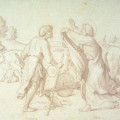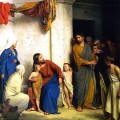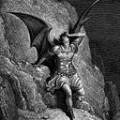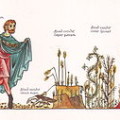1 He summoned the Twelve and gave them power and authority over all demons and to cure diseases,
2 and he sent them to proclaim the kingdom of God and to heal [the sick].
3 He said to them, “Take nothing for the journey, neither walking stick, nor sack, nor food, nor money, and let no one take a second tunic.
4 Whatever house you enter, stay there and leave from there.
5 And as for those who do not welcome you, when you leave that town, shake the dust from your feet in testimony against them.”
6 Then they set out and went from village to village proclaiming the good news and curing diseases everywhere.
Jesus called the Twelve – these are the disciples that eventually became the Apostles; these are the men that shared the Last Supper with Him. On this occasion He gave them the power an authority that He had been using to cast out demons and to cure illnesses. On receiving this power they really did go throughout the countryside curing the sick and casting out demons. We have to pause and remind ourselves that Judas Iscariot – the one who betrayed Jesus – was one of these twelve disciples. He received power and authority from Christ to go on a mission in the world. When we consider Judas we have to note that He was a trusted emissary of Jesus and that he shared deeply in a unique grace. Yet, he ultimately betrayed Jesus. From his example, we must remember to never think “I’ve made it; I’m such a good Christian that someday I will surely go to heaven.” That particular judgement is reserved to God.
Anyway, back to the Twelve (whom I will refer to as apostles below). When Jesus sent them on their mission He told them to “take nothing for the journey.” And then he gave them a particular list of items not to bring. This list ticked off item by item exactly what was customary to take with you if you were going to set off on a journey. A brief description of these items is as follows:
- “neither walking stick” – the walking stick was an essential piece of equipment for a long journey on the highway. It was used for defense from wild animals and even to provide defense from highway robbers. If the apostle encountered some kind of threat and had no walking stick, then what was he going to do about it?
- “nor sack” – while on a journey, the sack was used to carry your effects, like your food, money, and extra coat. Jesus was essentially saying “you ain’t gonna need that.”
- “nor food” – ok so the apostle was going to have to rely on the generosity of others to get his meals.
- “nor money” – up to this point the apostle might have thought to himself that if he wasn’t given food, then he could always buy it. If he wasn’t given a place to stay, then he could always pay for a room for the night. But Jesus essentially tells them “you’re not going to be able to buy food or rent a room.”
- “and let no one take a second tunic” – the second tunic was a heavier outer garment. If you were caught outside overnight – like if you didn’t have enough money for a room – then your second tunic was essential for keeping warm during the long, cold night.
The apostle may have felt like Jesus said “go on a journey, but make sure you’re unprepared for the trip.” However, Jesus had equipped them; he “gave them power and authority over all demons and to cure diseases.” As for their material needs Jesus was making sure they had to be totally dependent on God to provide for their needs.
Our story doesn’t seem to have much of an ending. But the rest of the story is coming. We’ll read that after we read another pericope. So here, in my opinion, we have another story within a story. However, unlike the story of Jairus and the woman with the hemorrhage, this story-within-a-story isn’t contained all in one pericope. We’re going to need to read the next two pericopes to get to the end of this particular story.
Finally, we can again ask ourselves who we are in the story. Sometimes we’re the apostles that have been sent; sometimes we’re the people they cure; sometimes we’re the people that give the apostles food and lodging on their journey. However, sometimes we’re like the towns that reject the apostles.
Our prayerful response can be to pray for the grace to trust that God has our back when we go in service of him.
Related PostsScripture texts in this work are taken from the New American Bible, revised edition© 2010, 1991, 1986, 1970 Confraternity of Christian Doctrine, Washington, D.C. and are used by permission of the copyright owner. All Rights Reserved. No part of the New American Bible may be reproduced in any form without permission in writing from the copyright owner.




